| This article is of a series on |
| Criticism of religion |
|---|
Criticism of Islam has existed since its formative stages. Early written disapproval came from Jews[1][2][3][4] and Christians,[5][6][7][8][9] before the ninth century, many of whom viewed Islam as a radical Christian heresy,[6][7][8][9] as well as by some former Muslim atheists and agnostics, such as Ibn al-Rawandi.[5] The September 11 attacks and other terrorist attacks in the early 21st century, reignited suspicion and criticism of all of Islam, with calls for moderates to condemn the terrorism of the fundamnatalists and help prevent radicilsation and islamophobia.[10]
Objects of criticism include the morality and authenticity of the Quran and the Hadiths,[11] along with the life of Muhammad, both in his public and personal life.[12][13] Other criticism concerns many aspects of human rights in the Islamic world (in both historical and present-day societies), including slavery,[14][15][16][17] treatment of women, LGBT groups, and religious and ethnic minorities in Islamic law and practice.[18][19] The issues when debating and questioning Islam are incredibly complex with each side having a different view on the morality, meaning, interpretation, and authenticity of each topic.
Middle Ages
- John of Damascus, a Syrian monk and presbyter.
- Persian scholar Ibn al-Rawandi (827–911 CE) started out as a Mu'tazilite Muslim, but later he repudiated Islam and revealed religion in general,[5] rejecting the authority of any scriptural or revealed religion, pointing out specific Muslim traditions and trying to show that they are laughable.[5]
- Persian polymath Abu Bakr al-Razi (c. 865–925 CE) is said to have been heavily critical of the institution of prophethood, the belief in miracles and the practice of obedience to religious authorities as against reason. However, according to Peter Adamson, Abu Bakr al-Razi may have been "deliberately misdescribed" by his fellow townsman Abu Hatim al-Razi. In this view, Abu Bakr was mainly arguing against the use of miracles to prove Muhammad's prophecy, against anthropomorphism, and against the uncritical acceptance of taqlīd vs naẓar.[20]
- Abu Isa al-Warraq was a ninth-century Arab skeptic scholar and critic of Islam and religion in general. Al-Warraq also doubted claims portraying Muhammad as a prophet.[21]
- Arab skeptic, rationalist philosopher and poet Al-Maʿarri (973-1057 CE) started out as a Sunni Muslim but later he repudiated Islam,[22] became a critic of Abrahamic religions and Islam, and wrote a satire on the Qu'ran.[22] He wrote and taught that religion itself was a "fable invented by the ancients"[23] and that humans were "of two sorts: those with brains, but no religion, and those with religion, but no brains."[24]
- Manuel II Palaiologos, Byzantine Emperor, wrote in 1391 "Show me just what Muhammad brought that was new and there you will find things only evil and inhuman, such as his command to spread by the sword the faith he preached".[25]
Early Modern period
- Martin Luther, the father of the Protestant Reformation, wrote on Islam.
- French polymath and philosopher Voltaire wrote Mahomet, ou Le Fanatisme (1741), a religious satire on the life of Muhammad,[26] described as a self-deceived,[27] perverted[27] religious fanatic and manipulator,[26][27] and his hunger for political power behind the foundation of Islam.[26][27] He also wrote letters on the brutality of Muhammad and his followers, affirming that it stemmed from superstition and lack of Enlightenment.[28]
19th century
- During the late 19th and early 20th century, the new methods of Higher criticism were applied to the Qu'ran, claiming that it had a non-divine origin. Ignác Goldziher and Henry Corbin wrote about the influence of Zoroastrianism, and others wrote on the influence of Judaism, Christianity and Sabianism.[29]
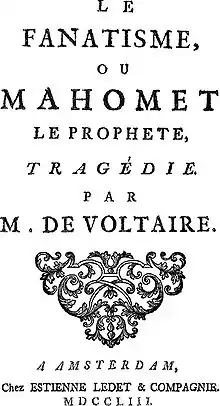
- Alexis de Tocqueville, French political thinker and historian, said about Islam: "I studied the Kuran a great deal ... I came away from that study with the conviction that by and large there have been few religions in the world as deadly to men as that of Muhammed."[30]
- John Quincy Adams, sixth President of the United States (1825–1829), wrote: "In the seventh century of the Christian era, a wandering Arab of the lineage of Hagar [i.e., Muhammad], the Egyptian, combining the powers of transcendent genius, with the preternatural energy of a fanatic, and the fraudulent spirit of an impostor, proclaimed himself as a messenger from Heaven, and spread desolation and delusion over an extensive portion of the earth.[30]
- Hilaire Belloc, Anglo-French writer and historian.
- G.K. Chesterton, English writer.
- Dayanand Saraswati, in his book Satyarth Prakash, he criticized Islam.
- Pandit Lekh Ram was an Arya Samaj Hindu leader and writer in India who was active in converting Muslims to Hinduism.
- Winston Churchill, the British Prime Minister through most of World War II, criticized what he alleged to be of the effects Islam had on its believers. In his 1899 book The River War he attributed to Muslims their fanatical frenzy combined with fatalistic apathy, enslavement of women, and militant prozelityzing.[31]
Contemporary critics
Muslims
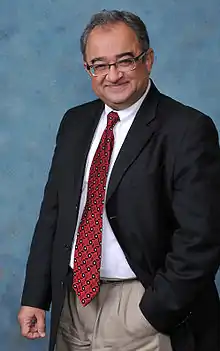
- Chekannur Maulavi-Founder of Quranist Movement in Kerala. Critic of Hadith.[32][33]
- Ibrahim Al-Buleihi is a Saudi liberal writer, thinker and philosopher who is currently a member of the Saudi Shura Council.
- Irshad Manji (born 1968), a Ugandan-Canadian of Egyptian and Gujarati descent, is a journalist, Quranist Muslim, and advocate of a "reformist" interpretation of Islam.[34]
- Tarek Fatah (1949 - 2023) is a Pakistani-Canadian writer and broadcaster, as well as a secular, progressive, and liberal activist.
- Necla Kelek (born 1957) is a Turkish-German feminist and social scientist.
- Raheel Raza (born 1949/1950) is a Pakistani-Canadian moderate Muslim critical of "Islamic extremism" and of what she has called "inequality toward Muslim women".[35]
- Zuhdi Jasser, medical doctor and former Lieutenant Commander in the United States Navy, president and founder of American Islamic Forum for Democracy.[36]
- Stephen Suleyman Schwartz (born 1948) is an American Sufi convert, journalist, columnist, and author. His background is on the traditional political left. He is a critic of Islamic Fundamentalism, especially the Wahhabi sect of Sunni Islam.
- Khalid Duran (1939–2010), born in Spain to Hispano-Moroccan Muslim parents, worked in many countries, was a specialist in the history, sociology and politics of the Islamic world, and coined the term "Islamofascism" to describe the push by some Islamist clerics to "impose religious orthodoxy on the state and the citizenry".[37]
- Mohammad Tawhidi Muslim influencer and reformist Imam.He has been embraced by a number of far-right and Islamophobic groups.
- Tufail Ahmad British journalist and political commentator of Indian origin and MEMRI reporter [38][39][40][41][42]
- Seyran Ateş opened a liberal mosque in Berlin to break with conservative traditions. The mosque caused international backlash from Muslims. Since then she has been living under police protection.
- Qanta Ahmed a British-American physician and author who describes herself as a practicing Muslim and a feminist but is opposed to Islamism and calls on Western governments to ban organizations such as the Muslim brotherhood.[43]
Former Muslims
There are also outspoken former Muslims who believe that Islam is the primary cause of what they see as the mistreatment of minority groups in Muslim countries and communities. Almost all of them now live in the West, many under assumed names as they have had death threats made against them by Islamic groups and individuals.
Converts to other religions
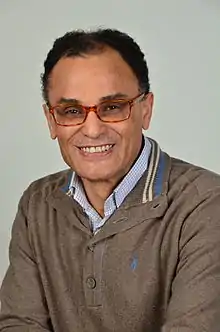
- Nonie Darwish, an Egyptian-American convert to Protestant Christianity who founded the pro-Israel web site Arabs for Israel and stated that "Islam is more than a religion, it is a totalitarian state".[44] She is also the author of Now They Call Me Infidel: Why I Renounced Jihad for America, Israel, and the War on Terror.
- Magdi Allam, an outspoken Egyptian-born Italian journalist who describes Islam as intrinsically violent and characterised by "hate and intolerance".[45] He converted to Catholicism and was baptised by Pope Benedict XVI during an Easter Vigil service on March 23, 2008.
- Zachariah Anani, a Baptist Christian and a former Sunni Muslim Lebanese militia fighter. Anani said that Islamic doctrine teaches nothing less than the "ambushing, seizing and slaying" of non-believers, especially Jews and Christians.[46]
- Anwar Shaikh (1928–2006) was a Pakistani-British author who converted to Hinduism and wrote several books critical of Islam.[47]
- Sabatina James (born 1982) is a Pakistani-Austrian author and convert to Roman Catholic Christianity who was meant to undergo an arranged marriage with her cousin but escaped and started a new life
- Mosab Hassan Yousef, the son of a Hamas founder, a former Israeli spy, and a convert to Christianity. He has written Son of Hamas: A Gripping Account of Terror, Betrayal, Political Intrigue, and Unthinkable Choices.
- Majed el-Shafie is an Egyptian-Canadian convert to Christianity who was tortured and condemned to death for apostasy in his fatherland. He is the president and founder of One Free World International (OFWI), a human rights organization.
- Ali Sina, pseudonym of the founder of several anti-Islam and anti-Muslim websites
- Sarah Haider founded the organization Ex-Muslims of North America after she left Islam. Haider supports other ex-Muslims.
- Rachid Hammami (born 1971, Morocco) is a Moroccan Christian convert from Islam who hosts a weekly call-in show where he criticizes Islam.
- Nabeel Qureshi, Ahmadhia Muslim converted to Christianity. His book Seeking Allah and finding Jesus is famous among Christians and Muslims. He had debated with Muslim scholars.
Ex-Muslim irreligionists
- Ahmad Kasravi-was a pre-eminent Iranian linguist, nationalist, religious reformer, historian and former Shia cleric[48]
- Ali Dashti-Iranian Senator and critic of Prophet Muhammad in "Twenty Three Years" in Persian.[49]
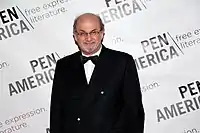
- Ayaan Hirsi Ali (born 1969), Somali-born Dutch-American writer and politician. She has focused on the rights of Muslim women, saying that "they aspire to live by their faith as best they can, but their faith robs them of their rights."[50]
- Salman Rushdie (born 1947), Indian-British novelist and essayist. His fourth novel, The Satanic Verses (1988), was the centre of a major controversy.
- Taslima Nasrin, Bengali/Bangladeshi ex-physician turned feminist author. She is an atheist and a severe critic of Islam and of religion in general who describes herself as a secular humanist.[51][52]
- Nyamko Sabuni, Burundian-Swedish atheist, served as the Minister of Integration and Gender Equality (Sweden, 2006–2013) and advocated to ban the veil, as well as establish compulsory gynecological examinations for schoolgirls to guard against female genital mutilation, stating, "I will never accept that women and girls are oppressed in the name of religion", and declaring it is not her intent to reform Islam but only to denounce "unacceptable" practices. She has received death threats, requiring 24-hour police protection, for her views.[53]
- Maryam Namazie, Iranian-born human rights activist, communist, atheist, the leader of the Council of Ex-Muslims of Britain, and a Central Committee member of the Worker-communist Party of Iran, wishing the overthrow of the current Iranian regime.[54]
- Ibn Warraq, secularist British author born in India and raised in Pakistan, intellectual, scholar and founder of the Institute for the Secularisation of Islamic Society and a senior research fellow at the Center for Inquiry[55][56][57] specializing in Qur'anic criticism.[58][59]
- Wafa Sultan, Syrian-American psychiatrist who has pointed out that the Muhammad said: "I was ordered to fight the people until they believe in Allah and his Messenger." Sultan has called on Islamic teachers to review their writings and teachings and remove every call to fight people who do not believe as Muslims.[60] Dr. Sultan is now in hiding as she received threats after appearing on the al-Jazeera TV show.[61]
- Turan Dursun (1934–4 September 1990), Turkish scholar and author. He worked as a Shi'a cleric before becoming an atheist during his study of the history of monotheistic religions. Dursun was assassinated outside his home in Istanbul.
- Mustafa Kemal Atatürk (1881–10 November 1938), Turkish field marshal, revolutionary statesman, author, and founder of the secular Republic of Turkey, serving as its first President from 1923 until his death in 1938. Sources point out that Atatürk was a religious skeptic and a freethinker. He was a non-doctrinaire deist[62][63] or an atheist,[64][65][66] who was antireligious and anti-Islamic in general.[67][68] According to Atatürk, the Turkish people do not know what Islam really is and do not read the Quran. People are influenced by Arabic sentences that they do not understand, and because of their customs they go to mosques. When the Turks read the Quran and think about it, they will leave Islam.[69] Atatürk described Islam as the religion of the Arabs in his own work titled Vatandaş için Medeni Bilgiler by his own critical and nationalist views.[70]
- Yahya Hassan (born 1995), Danish poet of Palestinian background who has attracted attention and stirred debate about Islam's place in Denmark based on poetry he wrote which was critical of Islam.
- Ehsan Jami (born 1985), Iranian-Dutch socialist politician.
- Yasmine Mohammed, Canadian educator and human rights activist.
- Majid Mohammadi. An Iranian-American sociologist who has published dozens of books on Shi`i Islamism, Islamist states, Islamist propaganda, and Islamist movements.
Christians
Christians of Mideastern background
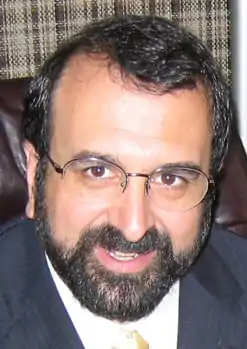
This subsection does not include converts to Christianity from Islam, who are instead listed in the subsection "Former Muslims". There is a large diaspora of Middle Eastern Christians in the West, some of whom have fled persecution in their homelands. In fact, most Middle Easterners in the United States come from Christian families.[71] Most belong to specific ethnoreligious—rather than simply religious—groups, as religion and ethnicity are largely intertwined in the Middle East.
- Robert Spencer (born 1962, a Melkite), American author and blogger best known for his criticism of Islam and research into Islamic terrorism and jihad.
- Brigitte Gabriel (born 1964, a Maronite Catholic), survivor of the sectarian Civil War in Lebanon (1975–1990), lived in Israel some time before moving to the United States, where she is an author, activist, and journalist. Gabriel founded the American Congress for Truth and ACT! for America.
- Nakoula Basseley Nakoula (born 1957, Copt) is an Egyptian-born US resident best known as a key figure in the production of the Innocence of Muslims,[72] an anti-Islamic video which was blamed by the Obama Administration for the 2012 Benghazi attack, an accusation that has been disputed by some and termed deliberately deceitful by others.[73][74]
- Zakaria Botros (born 1934 a Copt), Egyptian priest who has worked in Australia and is best known for his critiques of the Qur'an and other books of Islam. Al-Qaeda has put a $60 million bounty on his head.[75][76]
- Raymond Ibrahim (born 1973, a Copt), born in the United States to Egyptian immigrants, is an American research librarian, translator, author, and columnist. His focus is Arabic history and language,[77] and current events.
- Walid Shoebat An ex-Muslim, former PLO terrorist, and a Christian Zionist.[78][79]
Christians of non-Mideastern background

- Pat Robertson, expresses the view that "Islam wants to take over the world and is not a religion of peace", and that radical Muslims are "satanic", and that Osama bin Laden was a "true follower of Muhammad".[80]
- Jerry Falwell, another American conservative Baptist minister, characterized Muhammad as being a 'terrorist'.[81]
- Franklin Graham, described Islam as an 'evil and wicked religion' and suggested that those who believed Islam to be "wonderful" should "go and live under the Taliban somewhere".[82]
- R. Albert Mohler, Jr., president of Southern Baptist Theological Seminary, who described the Islamic theology as false and destructive and believes that Muslims are motivated by demonic power.[83]
- Brigitte Bardot (born 1934), French former actress, singer, and fashion model, who later became an animal rights activist. During the 1990s, she generated controversy by criticising immigration and Islam in France, and has been fined five times for inciting racial hatred.
- Pim Fortuyn (1948–2002), Roman Catholic, was a Dutch politician, sociologist, and founder of the Pim Fortuyn List party who provoked controversy with his stated views about multiculturalism, immigration, and Islam.
- Ann Coulter (born 1961), American conservative social and political commentator, writer, syndicated columnist, and lawyer.
- Steven Emerson, American journalist, author, and pundit on national security, terrorism, and Islamic extremism.
- Frank Gaffney, founder and president of the Center for Security Policy, columnist at The Washington Times, Big Peace, and Townhall, and radio host on Secure Freedom Radio.
- Srđa Trifković (born 1954), Serbian-American writer on international affairs and foreign affairs editor for the paleoconservative magazine Chronicles.
- Vladimir Zhirinovsky (1946–2022), Russian politician, leader of LDPR, believed that Russia should build a wall to stop Muslims from the Caucasus
- Bruce Bawer (born 1956), American writer who has been a resident of Norway since 1999. He is a literary, film, and cultural critic and poet who has also written about gay rights, Christianity, and Islam.
- Kathy Shaidle (born 1964), Roman Catholic, is a Canadian author, columnist, poet and blogger.
- Terry Jones (born 1951), pastor of Dove World Outreach Center, a small nondenominational Christian church. He first gained public attention in 2010 for his plan to burn Qur'ans on the ninth anniversary of the September 11 attacks.
Zionists and observant Jews

- Pamela Geller (born 1958), American conservative author, blogger, commentator, and political activist.[84][85] She is Jewish and has described herself as "a proud, fierce Zionist".[86] Her blog is Atlas Shrugs, the title of which is eponymous with an Ayn Rand novel.[84][87] She is a co-founder of SIOA with Robert Spencer, along with whom she is one of the best-known critics of Islam in the United States today.
- Daniel Pipes (born 1949), son of Jewish immigrants from Nazi-occupied Poland, is an American historian, writer, and political commentator. He is the president of the Middle East Forum.
- Bat Ye'or (born 1933), Egyptian-British writer and political commentator. She is from a Sephardi family, whom she was displaced with by the Suez War of 1956. Bat Ye'or has authored a fair number of works on the subject and coined the political neologism "Eurabia".
- David Horowitz, American writer and policy advocate, founder and current president of the David Horowitz Freedom Center, founder of Students for Academic Freedom.[88][89]
- Geert Wilders, Dutch politician and non-Jewish Zionist of agnostic views, wrote the short film Fitna and has campaigned to ban the Qu'ran in the Netherlands because it conflicts with the Dutch laws and calls for violence in general.[90]
- Benny Morris, Israeli historian who views the Israel-Palestinian conflict as a facet of a global clash of civilizations between Islamic fundamentalism and the Western World, saying that "There is a deep problem in Islam. It's a world whose values are different. A world in which human life doesn't have the same value as it does in the West, in which freedom, democracy, openness and creativity are alien."[91]
- Phyllis Chesler (born 1940), American writer, psychotherapist, and professor emerita of psychology and women's studies. In more recent years, Chesler has written several works on such subjects as antisemitism, Islam, and honour killings. Also, she has discussed the failure of organised Western feminism to address Islamic oppression of women due to the former's alliance with leftist currents.
- David Yerushalmi, Orthodox Jew, is an American lawyer and a political activist who has been called the driving law behind the anti-sharia movement in his country.[92]
- Debbie Schlussel (born 1969), Orthodox Jew of Polish pedigree, is an American-born attorney, film critic, conservative political commentator, and a blogger.
- Henryk Broder (born 1946), Polish-German journalist, author, and TV personality.
Members of Indian religions
Indian religions, also known as the Dharmic religions, include Hinduism, Jainism, Buddhism, and Sikhism. This subsection does not include converts from Islam, who are instead listed in the subsection "Former Muslims". See also the List of converts to Hinduism from Islam.
- B. R. Ambedkar (born 1891), was an Indian jurist, economist, politician and social reformer. He was independent India's first Minister of Law and Justice, and the chief architect of the Constitution of India.
- V. S. Naipaul (born 1932), Nobel prize-winning, Trinidadian-born British novelist of Hindu heritage, who claims that Islam has had a "calamitous effect on converted peoples", destroying their ancestral culture and history.[93]
- Ole Nydahl (born 1941), also known as Lama Ole, is a Danish Lama and a convert to the Karma Kagyu school of Tibetan Buddhism.
- Ashin Wirathu (born 1968), Burmese Buddhist monk, and the spiritual leader of the anti-Islamic movement in Burma.
- Sita Ram Goel (1921–2003), Indian activist, writer, and publisher who was critical of both Muslim and Christian influence over India. He had Marxist leanings during the 1940s but later became an outspoken anti-communist. A one-time atheist, he became an observant Hindu and in his latter career adhered to Hindu nationalism.
- Ram Swarup (1920–1998), independent Hindu thinker and prolific author. His works took a critical stance against Christianity, Islam and Communism.
- Nirad C. Chaudhuri (1897–1999), British writer and man of letters born in Kishoreganj, then part of Bengal in British India. He was sympathetic to the right-wing Hindu nationalist movement.
Western irreligionists
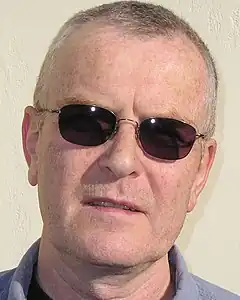
For irreligious former Muslims, see the above subsection "Former Muslims".
- Theo van Gogh (1957–2004), relative of the world-famous painter Vincent van Gogh, was a Dutch film director who collaborated with Ayaan Hirsi Ali to produce the short film Submission (2004) and was assassinated the same year by Mohammed Bouyeri, a Moroccan-Dutch Muslim.
- Michel Onfray, French philosopher and atheist. Onfray attacks Islam and other monotheistic religions, speaking of "Muslim fascism" that has risen with the Islamic Revolution in Iran, and considers Islamic teachings to be "structurally archaic".[94]
- Douglas Murray, British neoconservative writer and commentator.
- Oriana Fallaci, Italian journalist and novelist, wrote three short books after the events of September 11, 2001, advancing the argument that the "Western world is in danger of being engulfed by radical Islam".[95]
- Christopher Hitchens, British-American author and journalist.
- Sam Harris, in The End of Faith, argues that Muslim extremism is simply a consequence of taking the Qur'an literally, and is skeptical that moderate Islam is possible.[96]
- Richard Dawkins, biologist, author, public intellectual.[97]
- Koenraad Elst (born 1959), Belgian orientalist and Indologist known primarily for his writings in support for the Out of India linguistic theory. He was born to Flemish Catholic parents but[98] is an adherent of secular humanism, which may or may not be considered a religion.
- Jennifer McCreight (born 1987), American blogger, atheist, sceptic, and feminist who devised the 2010 Boobquake event in response to news reports that Iran's Hojatoleslam Kazem Seddiqi had blamed women who dress immodestly for causing earthquakes.
- Pat Condell, comedian and YouTube video blogger, who records videos about Islam and its alleged harmful effects particularly on British society.[99]
- Bill Maher, American comedian and political chat show host
- Tommy Robinson, founded and led the English Defence League.
- Anders Behring Breivik (born 1979), Norwegian perpetrator of the 2011 Norway attacks, sought to emulate the terrorist techniques of al-Qaeda[100] and has confessed that a motive for the crime was his intent to popularise his extensive manifesto, which deals with an array of social, political, and historical issues, partly written by him and partly cited from other authors. He has been emphatic in his description of himself as a "cultural Christian",[101][102] albeit strongly secular and hardly a believer.[101][102][103]
Practitioners of traditional African religions
The Traditional African religions are the traditional beliefs and practices of the African people. Some of these traditional beliefs includes the various ethnic religions of Africa.
- Tamsier Joof (born 1973), British born dancer/choreographer, entrepreneur and radio personality of Senegalese and Gambian heritage expresses the view that: "neither Islam, nor Christianity are peaceful or Godly religions, but wicked and dangerous ideologies which have done nothing but destroyed Africa and her people since they landed on African shores." Tamsier, a devout follower of Serer religion (a ƭat Roog), regard Islam and Christianity as "foreign cults which have caused more damage to Africa and divided her people." He is a strong critic of the powerful Muslim brotherhoods of Senegal, whom he regard as greedy and selfish; and African Muslims and Christians who like to demonise the traditional religions of their forefathers, whom he regard as hypocrites and cowards.[104][105]
Other
- Alice Schwarzer (born 1942), a German feminist, has been criticizing political Islam for decades, particularly with regard to women's rights. Schwarzer also goes against contemporary feminists that, according to her, promote said Islam.
- Bill Warner (born 1941), American writer and the founder of the Center for the Study of Political Islam International.
- Howard Bloom (born 1943), American author, atheist, sociologist, and public relations professional in the music industry.
- Sami Aldeeb (born 1949), Palestinian lawyer with Swiss citizenship, author of many books and articles on Arab and Islamic law.[106]
- Alvin Tan (born 1988), Malaysian Chinese blogger, secularist and free-speech activist who has posted online content critical of Islam.[107]
References
- ↑
The Jews [...] could not let pass unchallenged the way in which the Koran appropriated Biblical accounts and personages; for instance, its making Abraham an Arab and the founder of the Ka'bah at Mecca. The prophet, who looked upon every evident correction of his gospel as an attack upon his own reputation, brooked no contradiction, and unhesitatingly threw down the gauntlet to the Jews. Numerous passages in the Koran show how he gradually went from slight thrusts to malicious vituperations and brutal attacks on the customs and beliefs of the Jews. When they justified themselves by referring to the Bible, Mohammed, who had taken nothing therefrom at first hand, accused them of intentionally concealing its true meaning or of entirely misunderstanding it, and taunted them with being "asses who carry books" (sura lxii. 5). The increasing bitterness of this vituperation, which was similarly directed against the less numerous Christians of Medina, indicated that in time Mohammed would not hesitate to proceed to actual hostilities. The outbreak of the latter was deferred by the fact that the hatred of the prophet was turned more forcibly in another direction, namely, against the people of Mecca, whose earlier refusal of Islam and whose attitude toward the community appeared to him at Medina as a personal insult which constituted a sufficient cause for war.
- ↑ Stillman, Norman A. (1979). The Jews of Arab Lands: A History and Source Book. Jewish Publication Society. p. 236. ISBN 978-0-8276-0198-7.
- ↑ Ibn Warraq, Defending the West: A Critique of Edward Said's Orientalism, p. 255.
- ↑ Andrew G. Bostom, The Legacy of Islamic Antisemitism: From Sacred Texts to Solemn History, p. 21.
- 1 2 3 4 John of Damascus, De Haeresibus. See Migne, Patrologia Graeca, Vol. 94, 1864, cols 763–73. An English translation by the Reverend John W. Voorhis appeared in The Moslem World, October 1954, pp. 392–98.
- 1 2 Buhl, F.; Welch, A.T. (1993). "Muḥammad". Encyclopaedia of Islam, Vol. 7 (2nd ed.), Brill. pp. 360–376, ISBN 90-04-09419-9.
- 1 2 Goddard, Hugh (2000). "The First Age of Christian-Muslim Interaction (c. 830/215)". A History of Christian-Muslim Relations. Edinburgh: Edinburgh University Press. pp. 34–41. ISBN 1-56663-340-0.
- 1 2 Quinn, Frederick (2008). "The Prophet as Antichrist and Arab Lucifer (Early Times to 1600)". The Sum of All Heresies: The Image of Islam in Western Thought. New York: Oxford University Press. pp. 17–54. ISBN 978-0-19-532563-8.
- 1 2 Curtis, Michael (2009). Orientalism and Islam: European Thinkers on Oriental Despotism in the Middle East and India. New York: Cambridge University Press. p. 31. ISBN 978-0-521-76725-5.
- ↑ Akyol, Mustafa (13 January 2015). "Islam's Problem With Blasphemy". The New York Times. Retrieved 29 September 2017.
- ↑ Kohler, Kaufmann; McDonald, Duncan B. (1906). "Bible in Mohammedan Literature". Jewish Encyclopedia. Kopelman Foundation. Retrieved 29 September 2018.
- ↑ Oussani, Gabriel (1914). "Mohammed and Mohammedanism". Catholic Encyclopedia. New Advent. Retrieved 29 September 2018.
- ↑ Warraq, Ibn (2000). The Quest for the Historical Muhammad. Amherst, New York: Prometheus Books. p. 103. ISBN 1-57392-787-2.
- ↑ Gordon, Murray (1989). "The Attitude of Islam Toward Slavery". Slavery in the Arab World. New York: New Amsterdam Books. pp. 18-47. ISBN 0-941533-30-1.
- ↑ Levy, Reuben (2000). "Slavery in Islam". The Social Structure of Islam. NY: Routledge. pp. 73–90. ISBN 0-415-20910-2.
- ↑ Willis, John Ralph, ed. (2013). Slaves and Slavery in Muslim Africa: Islam and the Ideology of Enslavement. Vol. 1. New York: Routledge. pp. vii–xi, 3–26. ISBN 978-0-714-63142-4.; Willis, John Ralph, ed. (1985). Slaves and Slavery in Muslim Africa: The Servile Estate. Vol. 2. New York: Routledge. pp. vii–xi. ISBN 0-7146-3201-5.
- ↑ See also History of slavery in the Muslim world, Arab slave trade, Slavery in the Ottoman Empire, and Slavery in 21st-century Islamism.
- ↑ "Saudi Arabia".
- ↑ Timothy Garton Ash (2006-10-05). "Islam in Europe". The New York Review of Books.
- ↑ Marenbon, John (14 June 2012). The Oxford Handbook of Medieval Philosophy. Oxford University Press. pp. 69–70. ISBN 9780195379488.
- ↑ Hecht, Jennifer Michael (2003). Doubt: A History: The Great Doubters and Their Legacy of Innovation from Socrates and Jesus to Thomas Jefferson and Emily Dickinson. Harper San Francisco. ISBN 0-06-009795-7.
- 1 2 "Al-Maʿarrī (Biography)". Encyclopædia Britannica. Encyclopædia Britannica, Inc. May 2018.
- ↑ Reynold Alleyne Nicholson, 1962, A Literary History of the Arabs, page 318. Routledge
- ↑ Freethought Traditions in the Islamic World Archived 14 February 2012 at the Wayback Machine by Fred Whitehead; also quoted in Cyril Glasse, (2001), The New Encyclopedia of Islam, p. 278. Rowman Altamira.
- ↑ Shadid, Anthony (16 September 2006). "Remarks by Pope Prompt Muslim Outrage, Protests". Washington Post. Retrieved 5 May 2015.
- 1 2 3 Quinn, Frederick (2008). The Sum of All Heresies: The Image of Islam in Western Thought. New York: Oxford University Press. pp. 62–64. ISBN 978-0-19-532563-8.
- 1 2 3 4 Almond, Philip C. (1989). Heretic and Hero: Muhammad and the Victorians. Wiesbaden: Harrassowitz Verlag. pp. 33–35. ISBN 3-447-02913-7.
- ↑ Referring to Muhammad, in a letter to Frederick II of Prussia (December 1740), published in Oeuvres complètes de Voltaire, Vol. 7 (1869), edited by Georges Avenel, p. 105.
- ↑ Warraq, Ibn (1995). Why I Am Not a Muslim. Amherst, New York: Prometheus Books. p. 35. ISBN 1-59102-011-5.
- 1 2 "Historical Quotes on Islam". Archived from the original on 2013-02-19. Retrieved 2012-12-18.
- ↑ Winston S. Churchill, from The River War, first edition, Vol. II, pages 248-50 (London: Longmans, Green & Co., 1899)
- ↑ "Home". khur-aansunnathsociety.com.
- ↑ "Documentary on Chekannur Moulavi". The Hindu. 11 April 2009.
- ↑ Krauss, Clifford (Oct 4, 2003). "An Unlikely Promoter of an Islamic Reformation". New York Times. Retrieved Aug 23, 2012.
- ↑ McGregor, Charles (February 19, 2008). "Speaker looks to be No. 1 on world hate list". DurhamRegion.com. Retrieved October 23, 2014.
- ↑ Jasser, M. Zuhdi (January 2008). "Exposing the". Middle East Quarterly.
- ↑ Scardino, Albert (2005-02-04). "1-0 in the propaganda war". The Guardian. London.
- ↑ Tufail Ahmad, Modi Rule: an Opportunity for Muslims, OPEN Magazine, 13 October 2014.
- ↑ "Tufail Ahmad - Journalist and commentator on South Asian affairs". tufailahmad.com. Retrieved 2015-03-12.
- ↑ Ahmad, Tufail (22 August 2016). "The Radicalisation Series: Analysing the threat to Muslim youths in India". Firstpost. Retrieved 10 September 2016.
- ↑ Ahmad, Tufail. Muslim Liberals Vs ISIS, New Indian Express, 3 March 2015.
- ↑ Bob Taylor, Muslim Voices demand Islamic reform, Communities Digital News, 8 March 2015.
- ↑ Ahmed, Qanta A. (10 March 2017). "Designate the Muslim Brotherhood a Foreign Terrorist Organization". National Review. Archived from the original on 2018-01-31. Retrieved 5 January 2019.
- ↑ "Nonie Darwish at YAF: "Islam is ... a totalitarian state"". The Jawa Report. 2007-11-10. Retrieved 2007-11-25.
- ↑ Owen, Richard (2008-03-24). "Pope converts outspoken Muslim who condemned religion of hate". The Times. London. Retrieved 2010-04-30.
- ↑ "canada.com - Page Not Found". Archived from the original on 2011-04-08. Retrieved 2011-01-17 – via Canada.com.
{{cite web}}: Cite uses generic title (help) - ↑ The Rushdie Affair: The Novel, the Ayatollah, and the West by Daniel Pipes, Pg. 283
- ↑ "KASRAVI, ʿAḤMAD – Encyclopaedia Iranica".
- ↑ "DAŠTĪ, ʿALĪ – Encyclopaedia Iranica".
- ↑ Ayaan Hirsi Ali, "Unfree Under Islam", The Wall Street Journal, August 16, 2005,
- ↑ "Stop saying Islam is a religion of peace: Taslima Nasreen". 3 July 2016.
- ↑ Bagchi, Suvojit (21 March 2015). "'Don't call me Muslim, I am an atheist'". The Hindu – via www.thehindu.com.
- ↑ Charter, David (2007-05-21). "Young, black, Swedish – the minister for controversy". The Times. London. Retrieved 2007-11-25.
- ↑ "News". The Telegraph. 15 March 2016. Archived from the original on 17 December 2008 – via www.telegraph.co.uk.
- ↑ The spectator 3 October 2007 "The great Islamic scholar, Ibn Warraq, one of the great heroes of our time. Personally endangered, yet unremittingly vocal, Ibn Warraq leads a trend. Like a growing number of people, he refuses to accept the pretence that all cultures are equal. Were Ibn Warraq to live in Pakistan or Saudi Arabia, he would not be able to write. Or if he did, he would not be allowed to live. Among his work is criticism of the sources of the Koran. In Islamic states this constitutes apostasy. It is people like him, who know how things could be, who understand why Western values are not just another way to live, but the only way to live — the only system in human history in which the individual is genuinely free (in the immortal words of Thomas Jefferson) to ‘pursue happiness’."
- ↑ "The spectator Oct 2007". Archived from the original on February 10, 2012.
- ↑ Stephen Crittenden L The Religion Report Ibn Warraq: Why I am not a Muslim Oct 10 2001 Secularist Muslim intellectual Ibn Warraq - not his real name - was born on the Indian subcontinent and educated in the West. He believes that the great Islamic civilisations of the past were established in spite of the Qur'an, not because of it, and that only a secularised Islam can deliver Muslim states from fundamentalist madness.
- ↑ The spectator Oct 2007 IQ2 debates on the topic "We should not be reluctant to assert the superiority of Western values" Archived 2012-02-10 at the Wayback Machine Ibn Warraq An independent researcher at the humanist Centre for Enquiry in the USA. Author of ‘Why I Am Not a Muslim’ (1995) and editor of anthologies of Koranic criticism and an anthology of testimonies of ex-Muslims ‘Leaving Islam’ (2003). A contributor to the Wall Street Journal and The Guardian, and has addressed distinguished governing bodies all over the world, including the United Nations in Geneva on the subject of apostasy. Current projects include a critical study, entitled ‘Defending the West: a Critique of Edward Said's "Orientalism"’ to be released 2007.
- ↑ Center for Enquiry Religion, Ethics, and Society - Experts and Scholars"Ibn Warraq, Islamic scholar and a leading figure in Qur'anic criticism, is a senior research fellow at the Center for Inquiry"
- ↑ "Archived copy". switch3.castup.net. Archived from the original on 1 March 2006. Retrieved 15 January 2022.
{{cite web}}: CS1 maint: archived copy as title (link) - ↑ Berman, Debbie (March 13, 2006). "Dr. Wafa Sultan Seeks Radical Change From Radical Islam". Israel National News. Archived from the original on December 9, 2006.
- ↑ Reşat Kasaba, "Atatürk", The Cambridge history of Turkey: Volume 4: Turkey in the Modern World, Cambridge University Press, 2008; ISBN 978-0-521-62096-3 p. 163; accessed 27 March 2015.
- ↑ Political Islam in Turkey by Gareth Jenkins, Palgrave Macmillan, 2008, p. 84; ISBN 0230612458
- ↑ Atheism, Brief Insights Series by Julian Baggini, Sterling Publishing Company, Inc., 2009; ISBN 1402768826, p. 106.
- ↑ Islamism: A Documentary and Reference Guide, John Calvert John, Greenwood Publishing Group, 2008; ISBN 0313338566, p. 19.
- ↑ ...Mustafa Kemal Atatürk, founder of the secular Turkish Republic. He said: "I have no religion, and at times I wish all religions at the bottom of the sea..." The Antipodean Philosopher: Interviews on Philosophy in Australia and New Zealand, Graham Oppy, Lexington Books, 2011, ISBN 0739167936, p. 146.
- ↑ Phil Zuckerman, John R. Shook, The Oxford Handbook of Secularism, Oxford University Press, 2017, ISBN 0199988455, p. 167.
- ↑ Tariq Ramadan, Islam and the Arab Awakening, Oxford University Press, 2012, ISBN 0199933731, p. 76.
- ↑ "Atatürk İslam için ne düşünüyordu? - Türkiye Haberleri - Radikal". July 22, 2017. Archived from the original on 2017-07-22.
- ↑
Even before accepting the religion of the Arabs, the Turks were a great nation. After accepting the religion of the Arabs, this religion, didn't effect to combine the Arabs, the Persians and Egyptians with the Turks to constitute a nation. (This religion) rather, loosened the national nexus of Turkish nation, got national excitement numb. This was very natural. Because the purpose of the religion founded by Muhammad, over all nations, was to drag to an including Arab national politics. (Afet İnan, Medenî Bilgiler ve M. Kemal Atatürk'ün El Yazıları, Türk Tarih Kurumu, 1998, p. 364.)
- ↑ "The Arab American Institute". Archived from the original on June 1, 2006.
- ↑ Isikoff, Michael (13 September 2012). "Man behind anti-Islam film reportedly is Egyptian-born ex-con", worldnews.nbcnews.com; accessed 22 July 2014.
- ↑ "The missing Benghazi email". WSJ. 30 April 2014. Retrieved May 28, 2014.
- ↑ "The Rachel Maddow Show". MSNBC. September 13, 2012.
- ↑ Chan, Cheryl (August 13, 2010). "Anti-Islam cleric with $60m bounty in Langley". The Province. Vancouver, British Columbia: canada.com. Archived from the original on 2012-06-06. Retrieved 2012-09-16.
- ↑ Jihad Watch (2009-06-09). "Interview with Father Zakaria Botros, 'Radical Islam's Bane'". Catholic Online. Catholic.org. Archived from the original on 2012-10-09. Retrieved 2012-09-16.
- ↑ "Terrorist letter's validity doubted", The Washington Times, October 18, 2005
- ↑ Luyken, Jorg (March 30, 2008). "The Palestinian 'terrorist' turned Zionist". Jerusalem Post. Retrieved March 23, 2010
- ↑ Priest, Dana and Arkin, William (December 2010) Monitoring America, Washington Post
- ↑ "Top US evangelist targets Islam". BBC News. 2006-03-14. Retrieved 2006-07-21.
- ↑ "Jerry Falwell calls Islam's Prophet a "Terrorist"". Associated Press. Retrieved 2006-07-21.
- ↑ "Franklin Graham: Islam Still Evil". Associated Press. 2006-03-16. Archived from the original on September 30, 2007. Retrieved 2006-07-21.
- ↑ "Speak about Islam clearly & without fear, Mohler says". Baptist Press. 2001-10-19. Archived from the original on 2012-02-12.
- 1 2 Barnard, Anne; Feuer, Alan (October 8, 2010). "Outraged, and Outrageous". The New York Times.
- ↑ "Archived copy". Archived from the original on 2012-12-10. Retrieved 2012-12-18.
{{cite web}}: CS1 maint: archived copy as title (link) - ↑ Lowenfeld, Jonah. "Anti-Muslim activist barred from speaking at Jewish Federation headquarters". Jewish Journal. June 25, 2012. Retrieved November 22, 2014.
- ↑ McGreal, Chris (August 20, 2010). "The US blogger on a mission to halt 'Islamic takeover'". The Guardian. London. Retrieved August 21, 2010.
- ↑ "al jazeera". Aljazeera.com. Retrieved 2018-08-15.
- ↑ TerrorismAwareness (25 August 2008). "David Horowitz on Al-Jazeera; Part 2 of 2". Archived from the original on 2021-12-19 – via YouTube.
- ↑ (in Dutch) PVV Verkiezingsprogramma, page 13
- ↑ "Survival of the fittest". Haaretz. 2004-01-08. Retrieved 2011-06-13.
- ↑ Elliott, Andrea (2011-07-30). "The Man Behind the Anti-Shariah Movement". The New York Times.
- ↑ VS Naipaul launches attack on Islam, 4 Oct 2011
- ↑ Michel Onfray: Atheist manifesto. The case against Christianity, Judaism and Islam. Carlton, Vic. 2007, pp. 199-214.
- ↑ "THE AGITATOR: Oriana Fallaci directs her fury toward Islam". The New Yorker. 2005-05-29. Archived from the original on August 25, 2012.
- ↑ Harris, Sam (2005). The End of Faith: Religion, Terror, and the Future of Reason. W. W. Norton; Reprint edition. pp. 31, 149. ISBN 0-393-32765-5.
- ↑ Emilsen, William W. (August 2002). "The New Atheism and Islam". The Expository Times. 123 (11).
- ↑ "The Problem of Christian Missionaries". bharatvani.org. Archived from the original on 18 August 2004. Retrieved 11 December 2010.
- ↑ "Pat Condell Youtube channel". YouTube.
- ↑ Larson, Nina. "Norway killer Anders Behring Breivik tells terror trial al-Qaeda inspired him, would repeat attacks if he could". National Post. April 17, 2012. Retrieved November 22, 2014.
- 1 2 "Anders Breivik Manifesto: Shooter/Bomber Downplayed Religion, Secular Influence Key". International Business Times. Archived from the original on 12 April 2012. Retrieved 13 September 2014.
- 1 2 Gibson, David (28 July 2011). "Is Anders Breivik a 'Christian' terrorist?". Times Union. Retrieved 29 July 2011.
- ↑ Menzie, Nicola (26 July 2011). "Norway massacre suspect manifesto rejects personal relationship with Jesus". Christianity Today. Archived from the original on 1 October 2011. Retrieved 28 July 2011.
- ↑ Open Mike : Prejudice against Seereer religion (A ƭat Roog) and other Traditional African religions in Senegambia and other parts of Africa (Wednesday, 8 February 2017)
- ↑ Open Mike : Slavery in Mauritania (Monday, 6th Feb 2017)
- ↑ "Home". sami-aldeeb.com.
- ↑ "Troll or hero? The sex blogger who's offending Muslims". BBC News. 3 May 2015. Retrieved 4 May 2015.